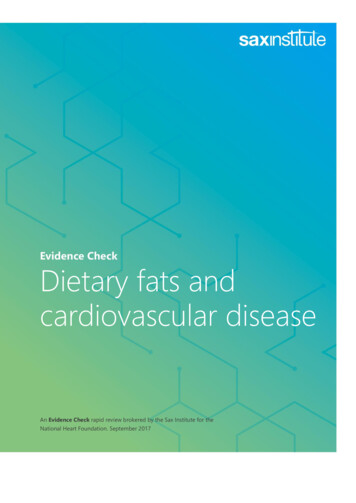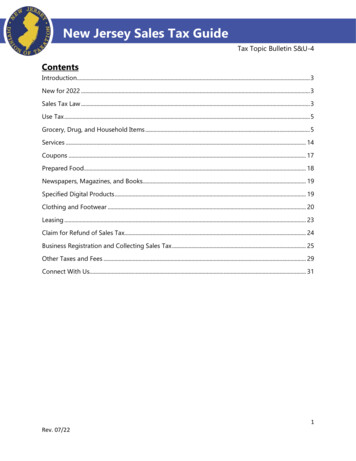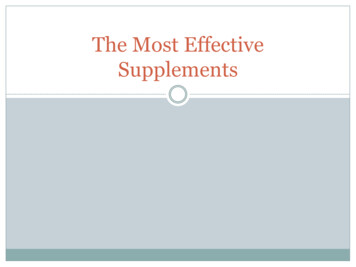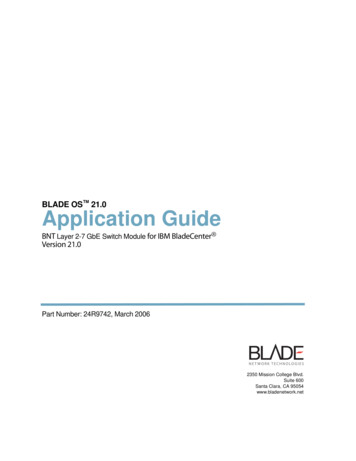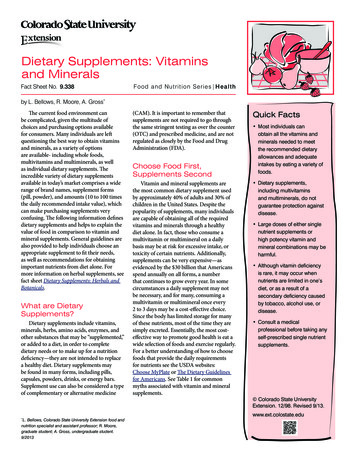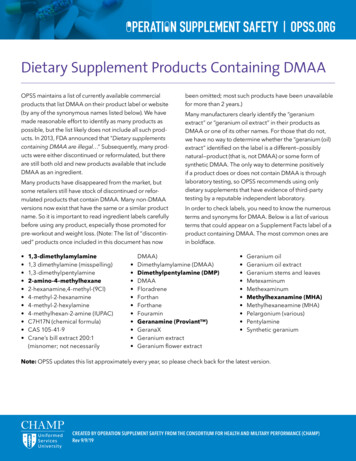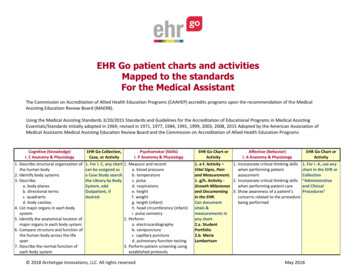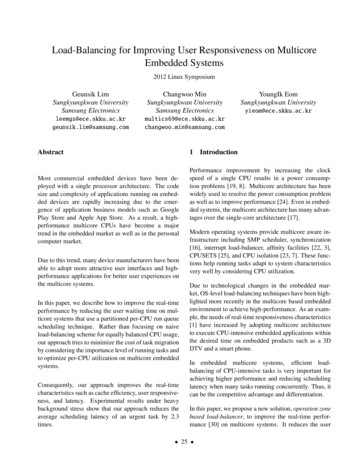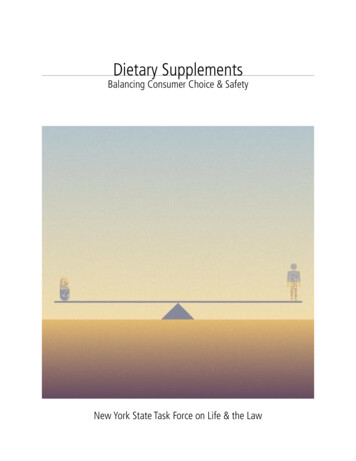
Transcription
Dietary SupplementsBalancing Consumer Choice & SafetyNew York State Task Force on Life & the Law1
2
Task Force MembersAntonia C. Novello, M.D., M.P.H., Dr.P.H., ChairpersonCommissioner of Health, State of New YorkKarl P. Adler, M.D.Archbishop’s Delegate for Health CareRev. Msgr. John A. Alesandro, J.C.D., J.D.Pastor, Church of St. DominicRabbi J. David Bleich, Ph.D.Professor of Talmud, Yeshiva UniversityProfessor of Jewish Law and Ethics, Benjamin Cardozo School of LawKathleen M. Boozang, J.D., L.L.M.Associate Dean of Academic Affairs, Health Law and Policy ProgramSeton Hall University School of LawKaren A. Butler, R.N., J.D.Partner, Thuillez, Ford, Gold, Johnson & Butler, LLPNancy Neveloff Dubler, LL.B.Director, Division of Bioethics, Department of Epidemiology and Population HealthMontefiore Medical Center, Professor of Bioethics, Albert Einstein College of MedicinePaul J. Edelson, M.D.Professor of Clinical Pediatrics, Columbia College of Physicians and SurgeonsSaul J. Farber, M.D.Dean and Provost Emeritus, Department of MedicineProfessor of Medicine, New York University School of MedicineAlan R. Fleischman, M.D.Senior Vice President, The New York Academy of MedicineRev. Francis H. Geer, M.Div.Rector, St. Philip’s Church in the HighlandsBenjamin Gelfand, P.T.Sports Therapy and Rehabilitation, PLLCSamuel Gorovitz, Ph.D.Founding Director, Renée Crown University Honors Program, Professor of Philosophy, Syracuse UniversityBioethicist in Residence, Yale UniversityJane Greenlaw, R.N., J.D.Director, Division of the Medical Humanities, Co-Director, Program in Clinical EthicsUniversity of Rochester School of Medicine and DentistryCassandra E. Henderson, M.D.Chief of Maternal Fetal Medicine, Our Lady of Mercy Medical CenterAssociate Professor of Obstetrics and Gynecology, New York Medical College3
Kathryn C. Meyer, J.D.Executive Vice President and General Counsel, Continuum Health Partners, Inc.John D. Murnane, J.D.Partner, Fitzpatrick, Cella, Harper & ScintoMaria I. New, M.D.Professor of Pediatrics & Director, Adrenal Steroids Disorders ProgramThe Mount Sinai School of MedicineSamuel Packer, M.D.Chairman, Department of Ophthalmology, North Shore Long Island Jewish Health SystemRabbi A. James Rudin, D.D.Senior Interreligious Advisor, The American Jewish CommitteeBarbara ShackHealth Policy ConsultantRogelio Thomas, M.D., M.P.P.President, Special Care Medical AssociatesSally T. True, J.D.Partner, True, Walsh & MillerTask Force Liaison to Department of HealthDonald P. Berens, Jr., J.D.General CounselNew York State Department of HealthTask Force StaffTia Powell, M.D.Executive DirectorMichael A. Klein, J.D.Senior AttorneyKelly C. Pike, M.H.S.Principal Policy AnalystAnn M. QuerciaAdministrative AssistantDwayne C. Turner,, Ph.D., J.D., M.P.H.Former Executive DirectorJohn B. Renehan, J.D.Former Senior Attorney4
ContentsPrefaceExecutive Summary791. Ephedra: A Case Study in Dietary Supplement Safety15The Long Road to Federal Ephedra Regulation16The Need for State Action192. Consumer Choice: Dietary Supplement Utilization25Prevalence26Rationale for Use273. Safety: The Benefits and Risks of Dietary Supplements35Evidence36Potential Benefits37Potential Risks39Use by Children42Unsafe Supplements454. Federal Regulation of Dietary Supplements53A Brief History of Food, Drug, and Dietary Supplement Regulation53Dietary Supplement Health and Education Act (DSHEA) of 199455Other Federal Activity605. State Regulation and Private Sector Initiatives69State Regulation69Private Sector Initiatives746. Recommendations for New York State77Appendix A: Commonly Used Dietary SupplementsAppendix B: Selected Food & Drug Administration Enforcement Actions8599Index 1015
6
PrefaceThe New York State Task Force on Life & the Law was convened by gubernatorial mandate in 1985, andhas served since then as a resource in medical ethics for New York State government. In fulfilling its mandate,the Task Force has developed recommendations for public policy on a host of issues at the interface of law andmedicine, including: the determination of death; withholding and withdrawing life-sustaining treatment; organtransplantation; surrogate decision-making; physician assisted suicide; assisted reproductive technologies; andgenetic testing. Task Force recommendations have taken various forms, including proposals for law, regulation,and public education. Many Task Force recommendations have become New York State law, and have alsoserved as models for legislation in other states.This report examines dietary supplements, focusing on their safety, use by consumers, and regulation at thefederal and state levels. This topic is markedly different from previous Task Force reports, which have addressedmore classic issues in medical ethics, primarily at the beginning and end of life. However, the Task Force findstroubling ethical issues within the domain of dietary supplements. Informed choice is a significant issue withinmedical ethics, and has been a major focus of many Task Force reports. Informed choice depends upon access toadequate and accurate information, and occurs within a context of beliefs about the safety of available options.Consumers may presume that all dietary supplements are safe and the Task Force believes that this confidenceis unwarranted. The presumption rests on the belief that dietary supplements are safe because they are “natural,”because the federal government closely monitors them, and because health professionals are well informed aboutthe risks and benefits of dietary supplements. Each of these bases for the presumed safety of dietary supplements is flawed, as we examine in this report. The Task Force addresses the relative lack of sound scientific dataon dietary supplements, their limited government regulation, and the current deficits in education regardingdietary supplements. The Task Force recommendations call for greater attention to each of these three areas tohelp New York consumers make well-informed and safer choices.AcknowledgementsThe participation of clinicians, researchers, government officials, and others was critical to the deliberationsof the Task Force. For their formal presentations and participation in meetings with the Task Force, we thankLori Bielinski, Irene Catania, Michael H. Cohen, Kathleen Doyle, Kevin V. Ergil, Joseph Fins, Gail Geller, Arthur Grollman, Eleonore Herschberger, Tom Hiendlmayr, Joy Johnson-Wilson, Jane Kinsel, Fredi Kronenberg,Peter Martin, Monica Miller, Joseph. E. Pfeiffer, and Stephen Sporn.A number of external reviewers generously donated their time and expertise by reviewing draft versions ofthis report; without their help the report would not be as clear, accurate, or useful. Many thanks to our external reviewers Paul M. Coates, Norman L. Cantor, Margaret Gilhooley, Richard A. Merrill, Barbara A. Noah,and Paul Shekelle. We are also grateful for the contributions of a number of colleagues in the New York State7
government including Margaret B. Buhrmaster, Nina Daratsos, Roberta Z. Gilgore, Richard W. Jenny, MeganKearney, Joan Kehoe, Mark Kissinger, Daniel A. Luttinger, Sharon Stancliff, Lawrence Sturman, Mark Ustin,William C. Van Slyke, Karen Westervelt, Dennis P. Whalen, Ann M. Willey, and David Wollner.We also thank former Task Force interns Jill N. Averett, Elain Sobol Berger, Cynthia Bowkley, Katharine M.Ettinger, Joyce B. Kanaan, Stephanie M. Macholtz, Rachel A. Rappaport, and Mara Timourian for their hardwork.Finally, we would like to gratefully acknowledge the work of former Task Force staff members who contributed to this report. Dwayne C. Turner provided his expertise and guidance while serving as the ExecutiveDirector of the Task Force until 2003. He generously continued to offer his time, insight and assistance as aconsultant after his tenure at the Task Force. The Task Force thanks John B. Renehan, who served as the SeniorAttorney during much of the research and writing of this project. Special thanks are offered to Sally J. Velthauswho provided exceptional support to the Task Force members and staff.8
Executive SummaryDietary Supplements: Balancing Consumer Choice & SafetyThe dietary supplement industry is a multi-billion-dollar enterprise in the United States, and dietary supplement manufacturers and distributors enjoy nearly unfettered access to consumers in New York and throughoutthe United States. Millions of American consumers ingest these supplements; recent surveys report nearly halfof the American adult population routinely use dietary supplements.1The consumer turns to dietary supplements to maintain or improve health—perhaps to supplement a vitamin deficiency, lose weight, or support organ function—often believing them to be more natural, potent orpure than food or pharmaceuticals. Dietary supplements with a broad range of health claims are widely available, and the consumer may think that they have been proven effective. Dietary supplement labels need not listrisks or contraindications, and the consumer may assume that supplements are safe. In each case the consumermay be wrong.Dietary supplements are defined under federal law as products that are intended to “supplement the diet” andthat contain certain “dietary ingredients” such as vitamins, minerals, herbs, and amino acids.2 Dietary supplements are regulated as a class of foods, not as drugs. Like foods—and unlike drugs—most dietary supplementsare not screened for safety and effectiveness by the U.S. Food and Drug Administration (FDA). Federal lawdoes not permit dietary supplement labels to contain drug claims, such as assertions that supplements are intended to treat, diagnose, mitigate, prevent or cure diseases (absent prior government approval in specific cases).Yet the airwaves are filled with advertisements touting the health-promoting properties of dietary supplements,without mention of risk. The line between permissible and impermissible health claims for supplements is notalways clear to the consumer, who naturally may misconstrue the apparent bounty of medicinal-sounding riskfree benefits.But while many supplements may be beneficial, they are not without risks. As discussed in Chapter 3 of thisreport, these risks include the following:· Certain dietary supplements have been associated with severe side effects (e.g., kava with liver failure,aristolochic acid with kidney failure);· Certain dietary supplements have known side effects comparable to those associated with pharmaceuticals;· Persons “self-medicating” with dietary supplements may delay necessary effective conventional medicaltreatment, and exacerbate disease;· Dietary supplements may interact with common prescription and over-the-counter medications;· The misperception that “if a little is a good, more has to be better” can lead consumers to mega-dose,risking toxic effects even from “safe” dietary supplements.9
It is hoped this report is a first step toward giving New York consumers the power to make more informedchoices about dietary supplements. The Task Force is recommending state-level actions because current federaloversight of dietary supplements is inadequate. Measures by New York State are warranted until the federalgovernment implements adequate standards and enforcement for manufacturing, safety, and effectiveness.The current scope of federal oversight of dietary supplements was established primarily by the Dietary Supplement Health and Education Act (DSHEA) of 1994.3 Among the provisions of DSHEA is an expandeddefinition of dietary supplements and dietary ingredients; guidelines for advertising and marketing of dietarysupplements; requirements for dietary supplement product labels, and the authority for the FDA to establishgood manufacturing practices for dietary supplement manufacturers.The supplement industry has long maintained that the FDA has ample authority under DSHEA to regulatesupplements and even remove them from the market when necessary. The Task Force strongly disagrees. Consider ephedra, once the dietary supplement industry’s biggest moneymaker, whose sale the FDA finally restricteda decade after serious health concerns emerged. The FDA was aware of serious adverse events associated withephedra as early as 1994.4 Yet not until 2004 did the FDA determine that ephedra posed an “unreasonable risk”of illness or injury when used under its suggested or ordinary conditions of use, and issued a regulation thatessentially banned the sales of ephedra supplement products nationwide.5 Then in April 2005, a federal districtcourt questioned the method by which FDA had shown unreasonable risk, and struck down the ban, at least asit applied to certain “low-dose” ephedra products.6The lesson of ephedra is that states must be prepared to act when the FDA does not, or cannot. Indeed, anumber of states, concerned by delays at the federal level, acted independently to regulate ephedra. In NewYork, Governor George E. Pataki signed into law a statewide ban on dietary supplements containing ephedra,effective in October 2003, citing his concern for the health and well-being of New Yorkers.7The Task Force supports state action in light of the following facts, among others:· DSHEA does not require dietary supplement manufacturers to submit safety data to the FDA beforetheir products are sold to consumers.· DSHEA does not require manufacturers to report adverse events associated with dietary supplements tothe FDA or any other entity.· DHSEA does not require manufacturers to include risk information on product labels, even for dietarysupplements that have been associated with serious adverse events.The federal government has the ability to address these problems. Unless and until these problems are remedied at the federal level, however, New York State action is required.* * *The following recommendations contemplate an Expert Committee to consider specific dietary supplementsin depth, and to advise the Department of Health on provisions for ensuring the safety of New York consumersby mandating appropriate collection of data from adverse events and research, and by permitting an efficient response to evidence of risk through changes in labeling and retail restrictions as needed. An education campaignis also recommended to fill the gaps in public information.10
Recommendation IThe New York State Commissioner of Health should create an Expert Committee within the Departmentof Health to evaluate the safety and efficacy of dietary supplements on an ongoing basis. The Expert Committee will assess available data and make specific recommendations to the Commissioner of Health.Data on the safety and efficacy of dietary supplements emerge continually from scientific research, adverseevent reports, and other sources. Therefore, the Task Force recommends that an Expert Committee be created under the auspices of DOH to collect, evaluate, and retain all available data on the safety and efficacy ofdietary supplements. The committee will also evaluate dietary supplements to determine what (if any) dangerthey present to the public. These evaluations will result in specific policy or regulatory recommendations to theCommissioner of Health. These recommendations might range from issuing a public advisory to banning thesale of a particular dietary supplement or dietary supplement ingredient.The Expert Committee should consider the following policies supported by the Task Force based on currentinformation:i. Institute mandatory reporting by dietary supplement manufacturers and distributors of adverse eventsassociated with dietary supplements, with continued support for voluntary reporting by consumers, healthcare practitioners, and others.The FDA defines an adverse event as an incident of illness or injury that may be associated with a dietarysupplement (or a range of other products), whether or not there is a clear cause/effect relationship between theadverse event and the product. A serious adverse event is one that results in a death, life-threatening illness, hospitalization, disability, congenital anomaly, or medical intervention to prevent permanent injury or damage.8The FDA system for tracking adverse events related to dietary supplement use is inadequate. By its ownestimate, the FDA tracks few adverse events (as few as one percent in 2000).9 From 1994 to 1999, the FDAreceived less than ten reports of adverse events from dietary supplement manufacturers. Since they are notrequired to collect such information, some manufacturers had no data on adverse events, while others had information that they did not share with the FDA.10The Task Force believes that mandatory reporting of serious adverse events related to dietary supplement usewill enhance the ability of DOH to detect patterns of illness or injury resulting from individual products thatmay be adulterated, contaminated, or otherwise dangerous. In addition to mandatory reporting by manufacturers and distributors doing business in New York, retailers, consumers, and health care practitioners should beencouraged to report all dietary supplement-related adverse events that occur in New York State to the FDA.The Expert Committee should consider the following policies supported by the Task Force based on currentinformation:ii. Create a state-level registry of dietary supplement manufacturers and distributors doing business in NewYork State, or other equivalent mechanism for 1) assuring compliance with mandatory reporting of adverseevents, and 2) facilitating communication with dietary supplement manufacturers and distributors.The Expert Committee should consider the most effective means for the state to ensure compliance withmandatory adverse event reporting. One possible solution would be the establishment of a registry of thoseentities from which reporting is required.11
The Expert Committee should consider the following policies supported by the Task Force based on currentinformation:iii. Obtain statutory authorization for the Commissioner of Health to require, by regulation, specific labeling of dietary supplement packaging by manufacturers on such terms as the Commissioner may deemreasonable.Current federal dietary supplement labeling regulations fail to ensure that sufficient information is providedto facilitate consumer understanding.11 State-level labeling mandates can address deficits by 1) alerting consumers that particular products have not been determined to be safe and/or efficacious, and 2) informing consumersof risks that are reasonably suspected.The Expert Committee should consider what the Task Force believes are necessary steps to ensuring the flowof accurate and sufficient information to consumers. First, the power to require dietary supplement labelingshould be explicitly assigned by the Legislature to the Commissioner of Health. The Task Force recommendsthat the Commissioner of Health mandate that dietary supplement products that have not been proven safeduring pregnancy and lactation carry a warning label. Also recommended is the labeling of specific productsthat have known associated risks. Finally, the Expert Committee should consider recommending that theCommissioner mandate that the labels of all dietary supplement products sold in New York State bear the FDAMedWatch toll-free telephone number, to facilitate adverse event reporting.12The Expert Committee should consider the following policies supported by the Task Force based on currentinformation:iv. Obtain statutory authorization for the Commissioner of Health to ban the sale to minors or to all persons in New York State of specific dietary supplements found by the Commissioner to be unsafe.The Task Force is not recommending actions directed at specific dietary supplements. However, in the courseof research, the Task Force evaluated a number of dietary supplements that might be deemed unsafe. As twoinitial projects in this areas, the Expert Committee should (1) review the evidence for banning the sale to minorsof dietary supplements that are marketed as legal alternatives to illegal drugs, and (2) review data and considerbanning the sale of aristolochic acid, comfrey, and kava to all consumers in New York State.Recommendation IIThe Department of Health should undertake a major public health education campaign on dietary supplements, with variations specifically directed to different target groups.The public education campaign will provide information about dietary supplement risks and benefits, as wellas guidance for consumers in deciding whether or not to purchase dietary supplements, and how to respondto adverse events arising from dietary supplement use. Portions of the campaign should be tailored to different target audiences, including physicians and other health care professionals, complementary and alternativemedicine practitioners, coaches, educators, parents, and adolescents.* * *These recommendations strike an appropriate balance between two legitimate state purposes: respectingconsumer freedom to purchase potentially beneficial products, and protecting the health and safety of thoseconsumers. The proposed Expert Committee on dietary supplements would develop state-level measures for12
tracking serious adverse events associated with dietary supplements, increasing supplement-related informationavailable to consumers, and reacting to developing scientific literature on dietary supplements. An accompanying DOH education campaign would give consumers and health care providers a broader understanding ofthe potential risks and benefits associated with dietary supplements, thus allowing New Yorkers to make wellinformed choices about dietary supplements.Notes1 Institute of Medicine, Complementary and Alternative Medicine in the United States (2005), 258-259, website: ml, visited March 31, 2005.2 Dietary Supplement Health and Education Act of 1994, Public Law No. 103-417 (October 25, 1994), codified throughout U. S. Code (2003),Title 21, Chapter 9, § 321 et seq.3 Ibid.4 Commission on Dietary Supplement Labels, Report of the Commission on Dietary Supplement Labels, November 1997, 12-13, website: http://web.health.gov/dietsupp, visited December 2, 2004.5 U.S. Food and Drug Administration, Consumer Alert, “FDA Plans Regulation Prohibiting Sale of Ephedra-Containing Dietary Supplements andAdvises Consumers to Stop Using These Products,” December 30, 2003, website: 2003/advisory.html,visited December 30, 2003.6 Nutraceutical Corp. v. Crawford, No. 2:04 CV 409 TC, 2005 WL 852157 (D. Utah April 13, 2005).7 “Governor Pataki Signs Law Banning Sale of Ephedra Products,” November 3, 2003, website: 303.html; see also “Pataki signs ephedra ban,” The Business Review, November 3, 2003, website: 11/03/daily7.html, visited January 11, 2005; N.Y. Assembly Bill No. 6921, Ephedra Sale Ban, August 19, 2003.8 U.S. Food and Drug Administration, “Instructions for Completing the MedWatch Form,” website: ct.htm, visited January 11, 2005; see also U.S. Department of Health and Human Services, Office of Inspector General. Adverse EventReporting for Dietary Supplements: An Inadequate Safety Valve, April, 2001.9 A. Walker, “The Relation Between Voluntary Notification and Material Risk in Dietary Supplement Safety,” FDA Commissioned Paper, March 9,2000.10 U. S. Food and Drug Administration, News Release, “FDA News: Statement from FDA Deputy Commissioner Crawford regarding Metabolife,”August 15, 2002, website: tml, visited October 18, 2002; P. J. Hilts, “U.S. in Criminal Inquiryon Metabolife Product,” The New York Times, August 16, 2002, C1.11 DHHS, OIG, Dietary Supplement Labels: An Assessment, ii-iii, 12-14; see also DHHS, OIG, Dietary Supplement Labels: Key Elements, 10-11March 2003 (OEI-01-01-00120), website: , visited December 7, 2004.12 In concurrence with the recommendation of the Institute of Medicine, see Institute of Medicine, Dietary Supplements: A Framework for EvaluatingSafety, (Washington, DC: National Academies Press 2005).13
14
1. Ephedra: A Case Study in Dietary Supplement SafetyIn February 2004, the U.S. Food and Drug Administration published a regulation prohibiting sales of dietarysupplements containing ephedra, ten years after the agency first issued warnings about ephedra-based products.The effort to restrict ephedra has been surrounded by enormous controversy, pitting bereaved family membersagainst advocates for consumer choice and industry representatives. In April 2005, one year after the FDAephedra rule went into effect, a federal court stoked the fire by ruling in favor of a manufacturer’s challenge tothe regulatory ban.1This chapter reviews a number of case histories that provide a sense of the emotional intensity of the debateover ephedra, and then examines the process that resulted in restricted ephedra sales. This process will provide alens through which we can understand how dietary supplements are regulated, and will generate suggestions asto how the process can be improved, both on a national level and in New York State.Case 1: A 23-year-old baseball player arrived at spring training, overweight and out of shape, to begin conditioning drills in the hot, humid Florida weather. He collapsed during a workout and was rushed to the hospital,where his body temperature reached 108 degrees. Doctors performed emergency treatment for heat stroke.Back at training camp, a bottle of an over-the-counter dietary supplement containing ephedra was found in hislocker.2The player, Baltimore Orioles pitcher Steve Bechler, died the next day, February 17, 2003. The official causeof death was multi-system organ failure preceded by heat stroke. According to the medical examiner, significantamounts of the dietary supplement containing ephedra contributed to Bechler’s heat stroke. Also found inBechler’s blood were small amounts of two other stimulants, pseudoephedrine and caffeine.3 Bechler’s death wasthe most highly publicized adverse event associated with ephedra, but it was by no means the first.Case 2: In 1998, Anne Marie Capati, a Huntington, NY, mother of two died after consuming an ephedrabased weight loss supplement under the written advice of her personal trainer. During a workout geared towardshedding her post-pregnancy weight, Capati collapsed and was rushed to the hospital. Later that night, afterdoctors determined that Capati had suffered a stroke, excessive and uncontrollable bleeding in her brain led toCapati’s death. The doctors confirmed that the dietary supplement Capati was taking had elevated her bloodpressure to a dangerous level, causing the stroke.4Case 3: In 1996, 20-year-old Peter Schlendorf went to Florida with his friends for spring break. A residentof Asharoken, NY, he was a football player at the State University of New York at Albany. During the vacation,Schlendorf took an “herbal ecstasy” product purchased at a T-shirt shop. After Schlendorf took the pills, hisheart “began to race uncontrollably.”5 His friends left him in the motel room, and when they came back, hewas dead. An autopsy report concluded that Schlendorf had died from “cardiac arrhythmia caused by an herbalsupplement containing the drug ephedra.”6 There was no other evidence of drugs or alcohol in Schlendorf ’ssystem at the time of his death.15
The case reports of Bechler, Capati, and Schlendorf created significant media attention; their family membershave played significant roles in the effort to ban ephedra.7 These cases and others like them illustrate the intensity of the controversy generated by ephedra, and serve to draw attention to the scientific and regulatory issuessurrounding dietary supplements.* * *Traditional Asian medicine practitioners have used ephedra to treat asthma, allergies, colds, and hay feverfor more than 5,000 years. Ephedra is a natural source of the alkaloids ephedrine, pseudoephedrine, phenylpropanolamine (norephedrine), and cathine (norpseudoephedrine).8 When chemically synthesized, ephedrineis regulated as a pharmaceutical-grade drug.9 Many over-the-counter cold and flu remedies and prescriptionmedications for bronchial asthma contain synthetic ephedrine.Both controversial and lucrative, ephedra was most often used among American consumers for weight lossand to enhance athletic performance. Estimated sales of ephedra in 2003 reached approximately 1.4 billion.10Scientific data on the pharmacology of ephedra indicate that dietary supplements containing ephedrine alkaloids pose short- and long-term health risks.11 One study found that the relative risk for adverse reactions amongephedra users is 10- to 40-fold higher than the risk among those who use herbal products generally.12 Ephedra,especially when taken with caffeine,13 increases such side effects as nausea, vomiting, psychiatric symptoms including anxiety and mood swings, and autonomic hyperactivity and palpitations; serious adverse events associated with ephedra and ephedrine have included deaths, heart attacks, cerebrovascular accidents, and seizures.14The Long Road to Federal Ephedra RegulationThe Dietary Supplement Health and Education Act of 1994 (DSHEA)15 curtailed the federal government’sability to regulate ephedra and other dietary supplements. Under DSHEA, no pre-market safety testing orapproval of most dietary supplements is required and the Food and Drug Administration (FDA) is limited topost-market surveillance. Unlike prescription and over-the-counter drugs, the burden rests on the FDA to provethat a dietary supplement is unsafe, rather than on the manufacturer to prove that the product is safe. Further,the ability of the FDA to identify problems is limited, because DSHEA does not grant the FDA the authorityto demand reports of dietary supplement-related adverse events from
1. Ephedra: A Case Study in Dietary Supplement Safety 15 The Long Road to Federal Ephedra Regulation 16 The Need for State Action 19 2. Consumer Choice: Dietary Supplement Utilization 25 Prevalence 26 Rationale for Use 27 3. Safety: The Benefits and Risks of Dietary Supplements 35 Evidence 36 Potential Benefits 37 Potential Risks 39
